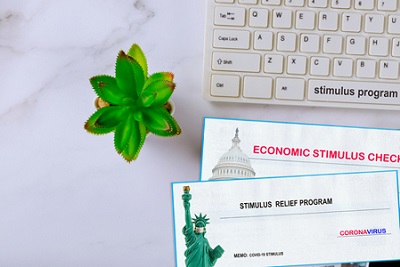The IRS has launched a new online tool called Get My Payment that allows expats who are eligible to receive a stimulus (economic impact) payment to provide their bank account details and so receive their payment by direct deposit.
The tool is welcome news for expats who may otherwise have to wait weeks or more to receive a check (assuming their local postal system is reliable, so it arrives at all), and then have to pay to post it back to the US to cash it, incurring a further delay assuming they are able to post it if they aren’t affected by a lockdown.
Update – the IRS has announced that eligible Americans must provide their bank details by Wednesday 13th May, otherwise they will receive their stimulus payment check by mail. Read on to find out more…
Stimulus Payments for Expats
Stimulus payments were announced as part of the CARES Act, passed on March 27th, to provide financial assistance to businesses and individuals affected by the Coronavirus outbreak.
The fact that expats were included in the program, which is referred to as a Recovery Rebate in the law and Economic Impact Payments by the IRS, was a welcome surprise, as the original bill excluded them.
The payments are worth $1,200 for expats whose annual adjusted gross income is less than $75,000 ($2,400 for couples who file jointly with less than $150,000).
After these thresholds the payment is reduced by $5 for every additional $100 of adjusted gross income until it reaches zero at $99,000 ($198,000 for couples filing jointly).
Furthermore, those expats with dependent children under the age of 17 receive $500 per child.
To qualify, expats must be up to date with their US tax filing (the IRS uses their latest tax return, for either 2019 or 2018, to calculate how much they receive, and they (and their spouses and children, to qualify for the additional amounts) must have US social security numbers.
“The Get My Payment tool also allows taxpayers to input their bank account information so that they can receive the money electronically rather than by a paper check – which could take weeks, or even months.” – CNN
The New IRS Get My Payment Tool
The stimulus payments are made automatically to a US bank account if one was included on expats’ most recent tax return). The new IRS Get My Payment tool allows expats who didn’t provide US bank details on their most recent return to provide them. Those who don’t will be mailed a check.
Payments have already started going out to folks who provided their bank details on their most recent return, as well as those who don’t file as their only income is social security benefits which they receive into a US bank account.
Which expats should use Get My Payment?
Get My Payment is exclusively for use by expats who have filed either a 2018 or 2019 tax return but didn’t provide their bank details.
Expats who haven’t filed because their income is less than the minimum filing thresholds (such as social security benefits recipients who don’t receive their check into a US account) should use a different tool, called Non-Filers: Enter Your Payment Info Here.
Minimum filing thresholds were $12,000 in 2018 or $12,200 in 2019 of worldwide income, or just $400 of self-employment income, or for expats who are married but file separately (to exclude their foreign spouse from the US tax system), just $5.
Expats who haven’t been filing from abroad because they didn’t know that they had to shouldn’t use either tool under any circumstances, as doing so could open them up to IRS back taxes and penalties (read on for further guidance).
How to use Get My Payment?
Get My Payment requires expats to input their adjusted gross income from their most recent tax return, the refund or amount owed that year, and the account and routing numbers for their US bank account where they want the payment deposited.
The tool also tells expats when their payment is due to be paid, or was paid.
Expats who haven’t filed US taxes
Expats who haven’t filed taxes for 2018 and 2019 because they weren’t aware that they have to should file under an IRS amnesty program called the Streamlined Procedure before providing their bank details, to avoid back taxes and penalties. They will still receive a stimulus payment this way, but without the same risk of back taxes and penalties.
Every expat’s situation is different, and it’s always worth consulting a US expat tax specialist to ensure not just that you’re compliant, but that you’re filing to your optimum advantage.



